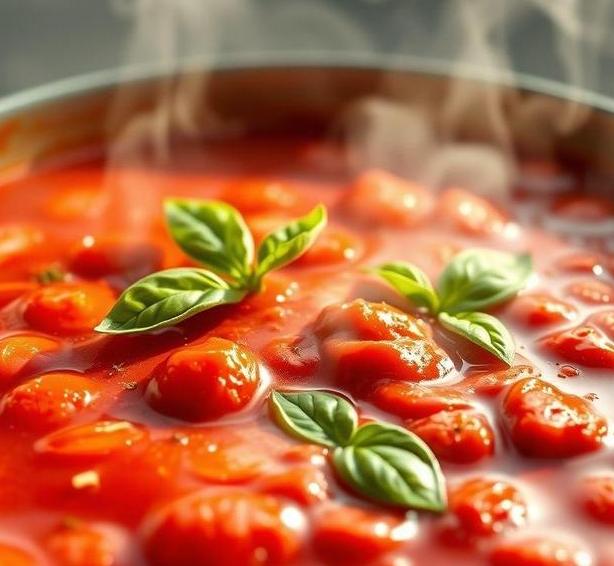Tomato pasta sauce is a staple in many kitchens. It’s a go-to for everything from a quick weeknight meal to an elegant dinner for guests. Whether it’s homemade or store-bought, that rich, tangy flavor and smooth consistency can elevate any pasta dish, pizza, or even a hearty casserole. But like all food items, you might find yourself asking-how long does tomato pasta sauce last? Does it go bad? And how can you make sure you’re storing it properly?
If you’ve ever found a forgotten jar of tomato pasta sauce lurking in the back of your pantry or fridge, wondering if it’s still safe to use, you’re not alone. You’re probably also wondering what exactly happens when it "goes bad," and how to recognize the signs. In this guide, we’ll answer all your questions and help you extend the life of your favorite sauce, whether it’s homemade or store-bought.
Can Tomato Pasta Sauce Go Bad?
In short, yes, tomato pasta sauce can go bad. Like any other food, pasta sauces are perishable, and their longevity is influenced by a variety of factors. The key to determining whether tomato pasta sauce has gone bad lies in how it’s stored and how long it’s been since it was opened.
For store-bought varieties, the ingredients in the sauce-typically tomatoes, olive oil, herbs, and sometimes cream or cheese-can still deteriorate over time, especially after the seal is broken. Homemade sauces, though, have an even shorter shelf life since they lack the preservatives often added to commercial products. This makes homemade tomato pasta sauce more prone to bacterial growth and spoilage.
The main issues that affect the shelf life of tomato sauce are:
- Bacterial Growth: If bacteria are introduced through improper storage, the sauce can spoil.
- Oxidation: Exposure to air can lead to changes in flavor and color, particularly if the sauce is left uncovered for too long.
- Temperature Changes: Fluctuations in temperature can cause sauces to deteriorate faster.
Understanding these factors will help you recognize the importance of both proper storage and the signs of spoilage.
Shelf Life For Tomato Pasta Sauce

The shelf life of tomato pasta sauce depends on whether it’s homemade or store-bought, and how well it’s stored. Let’s break down the expected time frames for each type:
Store-Bought Tomato Pasta Sauce
-
Unopened Jar/Can: If stored in a cool, dry place, an unopened jar or can of tomato pasta sauce typically lasts for 12 to 18 months past the best-by date.
- Why? The sauce is sealed in an airtight container and has preservatives that extend its shelf life.
-
Opened Jar/Can: Once opened, the sauce should be used within 5 to 7 days if stored properly in the fridge.
- Why? Exposure to air and the breakdown of preservatives makes it more vulnerable to spoilage after opening.
Homemade Tomato Pasta Sauce
-
In the Refrigerator: Homemade sauce generally lasts for 4 to 5 days when kept in the fridge.
- Why? Without the preservatives and added chemicals found in store-bought versions, homemade sauces are more susceptible to bacterial growth.
-
In the Freezer: You can extend its life significantly by freezing it. Homemade tomato sauce can last 4 to 6 months in the freezer.
- Why? Freezing slows down bacterial growth and preserves the sauce’s flavor and texture.
In either case, if you notice any drastic changes in color, texture, or smell, you should discard the sauce.
Common Signs Of Spoilage
Even though tomato pasta sauce may seem perfectly fine at first glance, there are several signs that could indicate that it has gone bad. If you notice any of the following, it’s time to toss it:
- Off or Sour Smell: Fresh tomato sauce has a pleasant, tangy aroma. If it starts to smell sour or fermented, it’s likely spoiled due to bacterial growth.
- Mold: Any visible mold-whether on the surface or around the lid-indicates that the sauce is no longer safe to consume.
- Discoloration: While tomato sauce can darken slightly over time, drastic color changes (such as deep brown or gray) could signal oxidation or spoilage.
- Separation: While some separation (oil rising to the top) is normal in tomato sauce, if the sauce starts to look overly watery or chunky, this can be a sign of spoilage.
- Change in Texture: A change from smooth and creamy to excessively thick or slimy might be a sign of bacterial growth.
- Fizzy or Bubbling Appearance: If you see bubbles or feel carbonation when opening a jar, it’s a clear indication that fermentation has occurred, which means the sauce is no longer safe to eat.
If you spot any of these signs, it’s best to discard the sauce immediately to avoid foodborne illness.
How To Store Tomato Pasta Sauce?

Proper storage is key to extending the shelf life of your tomato pasta sauce. Here are some essential tips to make sure your sauce stays fresh as long as possible:
Storing Store-Bought Sauce
Storing Homemade Sauce
Preventing Spoilage In The Future
- Avoid Cross-Contamination: When scooping sauce out of the jar or container, use a clean spoon every time to avoid introducing bacteria.
- Use Airtight Containers: Air exposure is a major factor in spoilage. Make sure the container is properly sealed to minimize exposure to oxygen.
- Proper Cooling: Always allow hot homemade sauce to cool to room temperature before storing it in the fridge or freezer. This reduces condensation inside the container, which could lead to faster spoilage.
Expert Tips
- Freezing in Small Portions: If you’re unsure how much of the sauce you’ll use, freezing it in smaller portions helps you avoid wasting food. Ice cube trays or muffin tins can work wonders for this.
- Avoid Storing in Cans: If you’ve opened a can of store-bought tomato sauce, don’t store the leftovers in the can. Transfer the sauce to a glass or plastic container instead. This prevents the metal from affecting the sauce’s flavor.
- Cooking and Freezing Homemade Sauce: When freezing homemade tomato pasta sauce, it’s important to cook it thoroughly first. Raw tomatoes may retain more moisture and not freeze as well.
- Adding a Layer of Olive Oil: For homemade sauces, you can cover the surface with a thin layer of olive oil before refrigerating to help preserve freshness and prevent air exposure.
FAQs
Can Tomato Pasta Sauce Go Bad If Left Out At Room Temperature?
Yes, tomato pasta sauce can go bad if left out at room temperature for more than two hours. Bacteria can grow rapidly in the sauce, leading to foodborne illness.
How Long Can Tomato Pasta Sauce Last In The Fridge After Opening?
Once opened, tomato pasta sauce can last about 5 to 7 days in the refrigerator. Be sure to store it in an airtight container to maintain its freshness.
Can Tomato Pasta Sauce Be Frozen To Extend Its Shelf Life?
Yes, you can freeze tomato pasta sauce for up to 3 months. Freezing helps preserve the flavor and texture, but some separation may occur upon thawing.
How Can You Tell If Tomato Pasta Sauce Has Gone Bad?
Signs that tomato pasta sauce has gone bad include a sour smell, discoloration, mold growth, and changes in texture. If the sauce looks or smells off, it’s best to discard it.
Can Expired Tomato Pasta Sauce Make You Sick?
Yes, expired tomato pasta sauce can harbor harmful bacteria and mold, which could potentially cause food poisoning. Always check the expiration date before use.
Does Tomato Pasta Sauce Have A Long Shelf Life?
Unopened tomato pasta sauce can last for a long time, typically 12 to 18 months, when stored in a cool, dry place. However, once opened, the shelf life decreases significantly.
Can You Eat Tomato Pasta Sauce Past The Expiration Date?
While tomato pasta sauce may still be safe to eat shortly after the expiration date if unopened and properly stored, it’s best to check for signs of spoilage. Once opened, it should be consumed within a week.
What Happens To Tomato Pasta Sauce When It Goes Bad?
When tomato pasta sauce goes bad, it may develop off smells, flavors, and textures. The acidity of the sauce may decrease, and it could become slimy or develop mold.
Can Homemade Tomato Pasta Sauce Go Bad?
Yes, homemade tomato pasta sauce can go bad. It should be refrigerated and consumed within 5 to 7 days. Freezing homemade sauce can also help extend its shelf life.
How Should You Store Tomato Pasta Sauce To Prevent It From Going Bad?
Tomato pasta sauce should be stored in an airtight container in the refrigerator after opening. For long-term storage, it can be frozen in portion-sized containers.